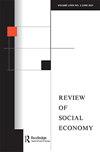Why expanding capabilities does not necessarily imply reducing injustice: an assessment of Amartya Sen’s Idea of Justice in the context of Mexico’s Oportunidades/Prospera
IF 1.6
Q2 ECONOMICS
引用次数: 0
Abstract
The idea that discussions about justice ought to offer practical political guidance has gained force in recent years. In this context, Sen's Idea of Justice (2009) aims at fulfilling this role. I assess to what extent Sen's comparative approach to justice succeeds in providing a useful conceptual framework to reduce injustice in practice, as it claims. Using the context of poverty in Mexico, and the social programme Oportunidades/Prospera as illustration, I argue that Sen's approach remains insufficient to guide injustice-reduction actions effectively. First, I note that despite enhancing individual's capabilities, these social improvements have not translated into a more just social reality overall. Second, I associate these shortcomings to the failure of capability-enhancing policies in accounting for the relational reproduction of injustice. Therefore, I conclude that to reduce injustice, we need to broaden the scope of injustice-reduction policies to address the ways in which injustice is reproduced through social interactions.为什么扩大能力并不一定意味着减少不公正:从墨西哥的机遇/繁荣看阿马蒂亚·森的正义观
近年来,关于正义的讨论应该提供切实可行的政治指导的想法越来越流行。在这种背景下,森的《正义理念》(2009年)旨在发挥这一作用。我评估森的司法比较方法在多大程度上成功地提供了一个有用的概念框架,以减少实践中的不公正,正如它所声称的那样。以墨西哥的贫困背景和社会方案Oportunidades/Prospera为例,我认为森的方法仍然不足以有效地指导减少不公正的行动。首先,我注意到,尽管提高了个人的能力,但这些社会进步并没有转化为更公正的社会现实。其次,我将这些缺点与能力增强政策在解释不公正的关系再生产方面的失败联系起来。因此,我的结论是,为了减少不公正,我们需要扩大减少不公正政策的范围,以解决通过社会互动再现不公正的方式。
本文章由计算机程序翻译,如有差异,请以英文原文为准。
求助全文
约1分钟内获得全文
求助全文
来源期刊

REVIEW OF SOCIAL ECONOMY
ECONOMICS-
CiteScore
2.60
自引率
10.00%
发文量
18
期刊介绍:
For over sixty-five years, the Review of Social Economy has published high-quality peer-reviewed work on the many relationships between social values and economics. The field of social economics discusses how the economy and social justice relate, and what this implies for economic theory and policy. Papers published range from conceptual work on aligning economic institutions and policies with given ethical principles, to theoretical representations of individual behaviour that allow for both self-interested and "pro-social" motives, and to original empirical work on persistent social issues such as poverty, inequality, and discrimination.
 求助内容:
求助内容: 应助结果提醒方式:
应助结果提醒方式:


